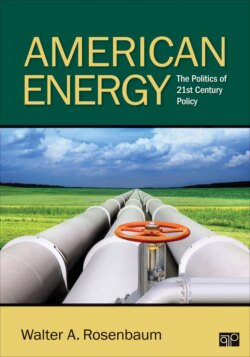Читать книгу American Energy - Walter A. Rosenbaum - Страница 28
На сайте Литреса книга снята с продажи.
Globalization
ОглавлениеThe most potent impact of the domestic energy crises of the 1970s was the harsh message that the United States was increasingly vulnerable to the vicissitudes of global energy supply, politics, and economics. In the years since 1970, the United States has had to recognize, among other unwelcome realities, that it controls a significant but diminishing proportion of the remaining global petroleum reserves and may never achieve “energy independence.” In this twenty-first-century world, the United States competes increasingly with rapidly developing non-Western nations for available petroleum supply, still stakes much of its national security on insecure foreign petroleum and unstable national governments, and confronts potentially severe domestic environmental risks from global fossil fuel consumption it cannot control. Economically, the domestic energy markets are increasingly sensitive to global macroeconomic events such as fluctuations in international energy exploration and production. All these global interdependences are tethered to equally significant economic implications and political complexities.
